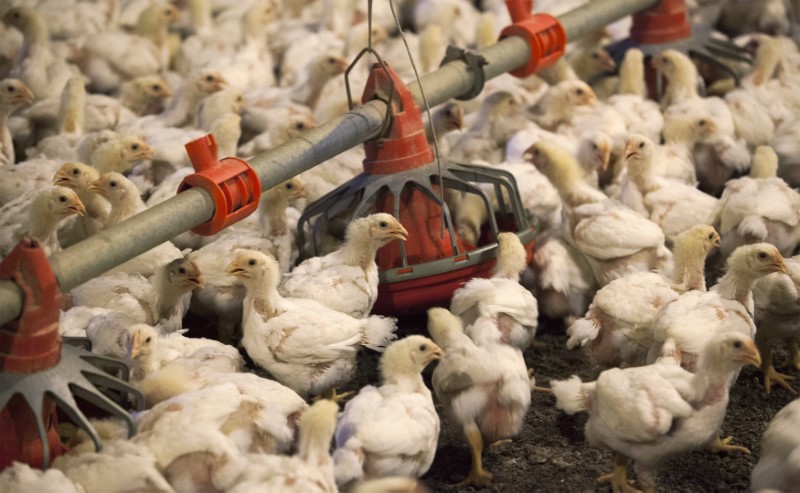 © Reuters. FILE PHOTO – Chickens feed from a row of feed bins at C&A Farms in Fairmont, North Carolina
© Reuters. FILE PHOTO – Chickens feed from a row of feed bins at C&A Farms in Fairmont, North CarolinaBEIJING (Reuters) – China’s Commerce Ministry said it has removed anti-dumping and anti-subsidy duties on U.S. white-feathered broiler chickens, ending a years-long dispute between the world’s largest economies amid growing tensions over agricultural trade.
The move, effective on Tuesday, comes after a World Trade Organization ruling in January that obliged Beijing to lower the tariffs unless it appealed within 20 days.
The tariffs were first imposed in 2010 and were extended for a further five years in 2016.
The removal of penalties comes against a backdrop of an escalating trade spat between the two countries, after Washington slapped duties on washing machines and solar panels, triggering a probe by Beijing into U.S. sorghum that was widely seen as retaliation.
The dispute has fueled concerns that soybeans might also be caught up in the trade actions.
The administration of U.S. President Donald Trump is considering imposing stiff curbs on steel and aluminum imports from China as well.
The move on broiler chickens is largely inconsequential for the American poultry industry, since China’s 2015 ban on imports of U.S. poultry, poultry products and eggs due to avian influenza remains in place. (http://reut.rs/2orFV8S)
“This is great news, but the market is still currently closed,” said Sarah Li, director for Greater China at the USA Poultry and Egg Export Council in Hong Kong.
The industry association visited China’s Ministry of Agriculture in January to urge the government to remove the import ban, which it considers to be no longer valid after an absence of outbreaks of highly lethal forms of the virus, she said.
Exports of poultry and eggs to China were worth hundreds of millions of dollars each year before the restrictions.
The withdrawal of the white-feathered broiler levy comes as Chinese President Xi Jinping’s top economic adviser, Liu He, was due to arrive in the United States for trade talks.
The official China Daily struck a conciliatory tone in a Tuesday editorial, saying Liu’s visit highlights that Beijing is seeking to work with Washington to tackle trade differences head-on.
“Frank and sincere talks with a willingness to agree on quid pro quo actions to achieve a mutually satisfactory solution are the best, if not only way, to avoid escalating retaliatory measures that would lead to a trade war that would be damaging for both,” the China Daily said.
Fusion Media or anyone involved with Fusion Media will not accept any liability for loss or damage as a result of reliance on the information including data, quotes, charts and buy/sell signals contained within this website. Please be fully informed regarding the risks and costs associated with trading the financial markets, it is one of the riskiest investment forms possible.
Source: Investing.com

























